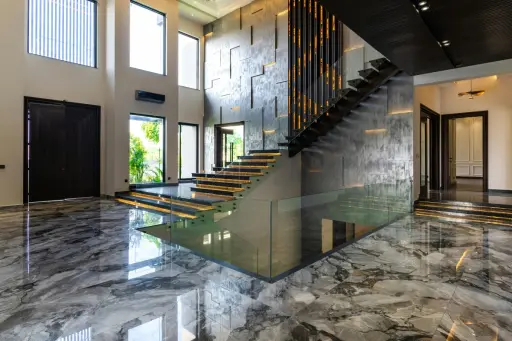Knight Frank
•09 Oct 2025
Top Nationalities Investing in Dubai's Luxury Property Market in 2025
Property Market Insights
Dubai's high-end real estate scene is showing impressive strength in 2025, drawing wealthy buyers from across the globe who see the city as one of the world's top spots for luxury property investments. Throughout the first six months of this year, we've seen strong sales activity and pricing, clear evidence that international appetite for Dubai's premium homes isn't slowing down anytime soon.
Knowing which countries are sending the most buyers helps developers, real estate agents, and investors get a better read on what's happening in the luxury property market. Now, it's worth noting that official government data breaking down buyers by nationality isn't always readily available. Most of what we know comes from sales figures that brokers track, their client lists, and broader market analysis rather than hard statistics from authorities. That said, certain trends have become pretty obvious, giving us a solid picture of which international groups are really driving Dubai's luxury property boom.
Indian Buyers Lead Dubai Luxury Property Demand
Indian nationals have been the biggest foreign buyer group in Dubai's luxury property market throughout 2025. Several factors explain why Dubai appeals so strongly to wealthy Indian individuals and families.
Location matters more than people realize. You can fly from major Indian cities to Dubai in just three to four hours, which makes it easy to pop over for business meetings or family visits. Owning property here actually makes sense from a practical standpoint, not just as some distant dream. Plus, there's already a well-established Indian community in Dubai, so new buyers aren't starting from scratch, they've got networks and familiarity right from the start.
Then there's the tax situation, which is hard to ignore. With no income tax, no capital gains tax on property, no inheritance tax, the UAE's setup beats most other markets by a wide margin. For successful business owners trying to manage their wealth smartly, these advantages really add up.
Indian buyers have varied tastes when it comes to luxury property Dubai options. Plenty go for upscale apartments in prime spots like Downtown Dubai and DIFC, where they get that urban lifestyle, easy access to business districts, and solid rental returns. But you'll also find family-focused buyers choosing large villas in places like Dubai Hills Estate and Arabian Ranches gated communities with good schools, security, and amenities that work well for raising kids.
British Buyers Maintain Strong Presence in Dubai Luxury Property
The UK ranks as the second biggest source of foreign buyers in Dubai's luxury market. For British investors, Dubai has become an increasingly appealing option compared to London's volatile property scene, they're after better returns and a way to spread their investment risk through carefully chosen second homes.
What do British buyers usually go for? High-end apartments and branded residences top the list. They particularly like developments that come with hotel management services, guaranteed rental income, and ownership arrangements that don't create headaches. Those branded residences properties tied to well-known hotel names really strike a chord with UK investors who value professional oversight and the cachet that comes with recognized international brands.
There's something about Dubai's mix of endless sunshine, top-tier infrastructure, and English as the business language that makes British buyers feel right at home. Most of them view their Dubai property as serving double duty: it's a lifestyle purchase for those winter getaways, but it's also a smart hedge against the economic ups and downs they're dealing with back in the UK. Add to that Dubai's straightforward buying process and clear legal system, and you can see why it appeals so much to British investors who expect markets to be properly regulated.
Russian Demand for Waterfront Dubai Luxury Property
Russian buyers continue representing a highly visible and significant segment within Dubai's luxury property market in 2025. This demographic shows particular preference for waterfront properties and exclusive gated communities offering privacy, security, and prestigious addresses.
Palm Jumeirah remains a perennial favorite among Russian high-net-worth individuals, with its iconic waterfront villas and apartments delivering the status and lifestyle combination that appeals to this buyer group. Emirates Hills often dubbed the "Beverly Hills of Dubai", attracts Russian buyers seeking ultra-exclusive villa communities with expansive plots and architectural freedom. Branded residences also feature prominently in Russian purchase patterns, with developments affiliated with luxury hotel brands commanding strong interest.
The Russian buyer profile typically skews toward higher price points, with many transactions occurring in premium and ultra-luxury segments above AED 10 million. This appetite for high-value properties makes Russian buyers particularly important for developers launching flagship projects that anchor new master-planned communities or waterfront developments.
Chinese Investors Target Growth in Dubai Luxury Property Market
Chinese buyer activity in Dubai's luxury property market has shown consistent growth throughout 2025, with this demographic increasingly recognizing the emirate's potential for long-term capital appreciation. Unlike some other nationality groups prioritizing immediate lifestyle benefits, Chinese investors often adopt a more strategic, growth-oriented approach to their Dubai property purchases.
Off-plan developments attract significant Chinese interest, with buyers comfortable committing to projects in early construction phases to maximize capital growth potential. Master-planned communities promising comprehensive infrastructure, integrated amenities, and phased development appeal to Chinese investors who understand the value creation occurring as these neighborhoods mature.
Chinese buyers also demonstrate increasing sophistication in their market analysis, working with specialized advisors who understand both Dubai's regulatory environment and Chinese capital movement regulations. As China's high-net-worth population continues seeking international diversification opportunities, Dubai's combination of accessibility, transparency, and growth potential positions it favorably within their global property portfolios.
GCC Nationals Drive Regional Dubai Luxury Property Investment

Saudi Arabia and other Gulf Cooperation Council (GCC) nations represent substantial demand sources for Dubai's luxury property sector. These regional flows benefit from easy travel, cultural familiarity, and established business networks spanning the Gulf.
Saudi buyers particularly favor larger villas and branded luxury projects accommodating extended families and providing turnkey lifestyle experiences. Many GCC buyers maintain Dubai properties as convenient second homes for weekend getaways, summer vacations during cooler Gulf months, and business trips. This usage pattern drives demand in communities offering both privacy and proximity to Dubai's commercial centers and entertainment districts.
Recent expansion of Golden Visa programs and long-term residency options has further incentivized GCC buyers to upgrade from short-term holdings to more substantial luxury investments qualifying for extended residence permits. This shift supports transaction volumes in higher price brackets, particularly for properties exceeding AED 2 million that trigger automatic Golden Visa eligibility.
Emerging Buyer Markets in Dubai Luxury Property
Beyond the top five nationalities, several other buyer groups have grown in Dubai's luxury market during 2025. Pakistani nationals represent a significant segment, often showing similar preferences to Indian buyers given shared cultural ties and regional proximity.
Italian and French buyers maintain steady demand, typically seeking lifestyle-oriented purchases in waterfront and beach locations. These Europeans want properties balancing investment return with personal use - planning multiple annual visits while earning rental income during their absence.
Egyptian and broader African buyers have emerged as important segments, reflecting Dubai's strengthening commercial ties across Africa and its positioning as a gateway between East and West. As African economies develop and produce larger high-net-worth populations, Dubai's infrastructure and stable regulatory environment appeal to buyers seeking secure wealth preservation.
Strategic Implications for Luxury Stakeholders
The nationality composition of Dubai's luxury buyer base carries important implications for developers, brokers, and investors operating in this sector. Successful market participants increasingly tailor their approach to specific nationality preferences rather than adopting one-size-fits-all strategies.
Marketing messages must resonate with each group's primary motivations, emphasizing family lifestyle and community for Indian and GCC buyers, highlighting yield and market stability for British investors, showcasing exclusivity and waterfront prestige for Russian clients, and communicating growth potential for Chinese buyers. Channel selection matters equally, with India-focused roadshows, regional broker networks, and China-specific digital platforms each playing distinct roles in reaching priority audiences.
Product development should reflect these preferences, with waterfront penthouses and branded residences serving Russian and European demand, gated villa communities addressing GCC and Indian family requirements, and off-plan master-planned projects capturing Chinese investment appetite.
Navigating Data Limitations and Market Dynamics
Those analyzing Dubai's luxury property market by nationality should recognize inherent data limitations. No single official registry comprehensively tracks buyer nationality at scale, meaning published rankings rely on broker sales data, company client databases, and media synthesis. Percentages and rankings should therefore be understood as informed estimates rather than definitive statistics.
This reality necessitates combining multiple data sources, Dubai Land Department transaction volumes, broker client breakdowns, and developer sales reports to build the most accurate possible picture. Given that nationality mix can shift rapidly in response to geopolitical changes, sanctions, travel restrictions, and visa policy adjustments, quarterly tracking and clear methodology disclosure become essential practices.
Dubai Luxury Property Continue Global Draw

Dubai's luxury property market in 2025 keeps thriving on its appeal to a genuinely international buyer base. Indian, British, Russian, Chinese, and GCC nationals lead demand, each bringing different motivations and preferences that collectively support a diverse and resilient market. As the emirate's infrastructure keeps expanding, its regulatory environment evolves to attract foreign capital, and global high-net-worth individuals seek secure wealth diversification, Dubai's position as a premier luxury property destination looks well-secured for years ahead.